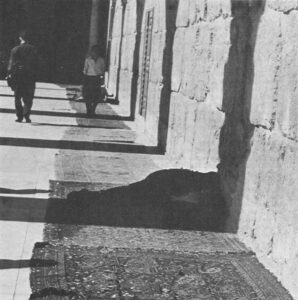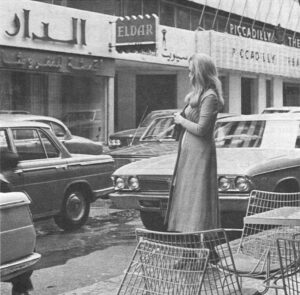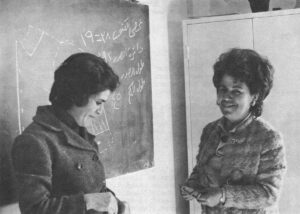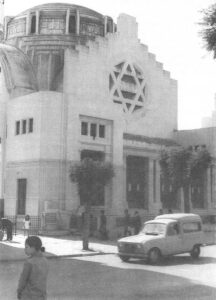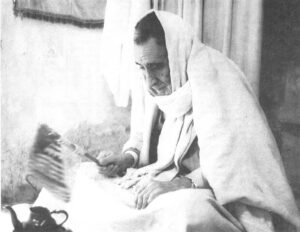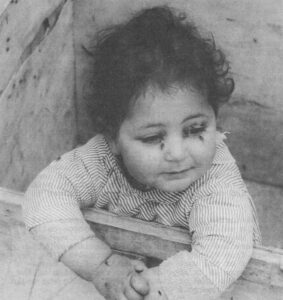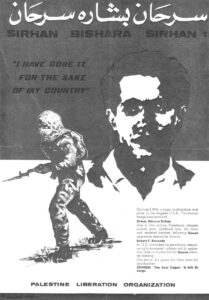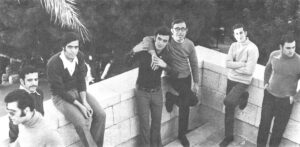The Palestinian guerrillas denounce it as a sinister plot. King Hussein doesn’t like it a bit. The Israelis shrug it off as purely an accident, then sit back and smile in satisfaction. Accidentally on purpose, Israel has been changing the occupied West Bank of Jordan and the Gaza Strip – now in their fifth year under Israel – such that if Israel ever returns the territories they will be qualitatively different from when Israel conquered them in 1967. “The area changes naturally as well as willingly on our part,” explained one Israeli official. “The administered territories (Israel’s euphemism for the occupied West Bank of Jordan and the Gaza Strip) are like a watch which we have taken. If after twenty years, we return it, that will not be the same watch. The watch will have dust on it.”
The official continued, “Israel’s rule helps people have better lives and lays the ground for peaceful existence.” Indeed, Israel’s economic policy in the area, which emphasizes cooperation between Israel and the occupied territories, has encouraged prosperity among the Arabs (see: Arab Bread). Moreover, when the future settlement comes, Israel likes to think that the economic cooperation will be a basis of lasting and peaceful economic cooperation between Jews and Arabs. “Whatever peace there shall be,” said a staff member of Israel’s Ministerial Committee on the Administered Territories, “the Arabs will say that they don’t want the borders with Israel closed.”
Officials often talk of two borders in any future settlement regarding the occupied areas: economic and political borders. Economic spheres would ideally overlap in some kind of cooperative economic confederation like Benelux. It would include Israel, Gaza, the West Bank, Jordan’s East Bank, and possibly markets in other Arab states. But while the economic borders might be invisible between the Arab unit or units and Israel, politically, say officials, it is only natural that men who feel themselves Arabs or Palestinians should want to align themselves in a separate Arab or Palestinian unit. The official line seems to tentatively envision separate political but closely coordinated economic units.
Thus far, Israel’s economic activity in the areas has had a significant impact. (See: A Long Shot Approach To Peace.) Officials, however, are careful about affecting definitive political changes. There is little doubt that economically, Israel has oriented the West Bank away from the other side of the Jordan River, King Hussein’s Transjordan. There are many indices of realignment in all sectors of the West Bank’s economy. Hussein no doubt resents the fact that the West Bank no longer depends on him. However, the observer must be careful not to conclude that the West Bank is thus becoming autonomous economically. It is probably as dependent – or more dependent – on Israel as it had been on Jordan. And simultaneously Israel’s policy includes maintaining West Bank ties with other Arab markets via the East Bank of Jordan. But, despite new ties with Israel and old ties with the East Bank, for the first time at least since King Hussein’s grandfather, King Abdullah, annexed the West Bank into Jordan, the West Bank which is all Palestinian is being treated as a separate unit.
Under these circumstances, political thinking among the population naturally tends to consider the idea of Palestinian political autonomy. Israel has – perhaps correctly -been accused of whetting the Palestinians’ appetite for autonomy on the West Bank, but Israel has also been very careful not to completely alienate King Hussein, who still claims the West Bank. One Israeli official summed up the government’s reasons: “The West Bank is occupied by Israel – occupied from Jordan. Time might pass; twenty or fifty years. It will be returned. To Whom? To Jordan and to whomever may be running Jordan at the time – King Hussein, [Fatah Leader] Yasir Arafat or Ja’abari [Sheikh Muhammad al Ja-abari, longtime mayor of West Bank town, Hebron].”
The Israelis are not eliminating the possibility that someday King Hussein might agree to a political settlement which the Israelis would favor. Israel’s prerequisites for peace with Jordan do not apparently accord with the United Nations November 1967 resolution’s formula of withdrawal from territories occupied in June 1967, in return for a peace settlement by direct negotiations. Rather Israel’s position seems to include Jordan’s agreeing to Israel’s de facto possession of Arab Jerusalem, which was annexed into Jewish Jerusalem in 1967, and a provision for Israel to guard the military security of the West Bank. Any such settlement with Jordan is doubtful at this time. But – so Israeli thinking goes – why trade off Hussein, who after all is backed diplomatically and militarily by the United States, whom the Israelis would like to avoid annoying as much as possible, for a political unknown: an autonomous Palestinian West Bank.
Foreign ministry officials speaking of Palestinian autonomy often sound like leaders of the Great Powers in the early decades of the century as they cursed those “damn fool Zionists” demanding a state of their own. One Israeli Foreign ministry official insisted that Israel could not talk with “non-governments.” “Palestinian leaders,” he said, “just don’t represent anyone.” “Besides,” the official continued, “we are not the proper authority to address. If the Palestinians want their own state, they will have to ask the man they gave it to: King Hussein as successor to King Abdullah.”
In fact the Foreign Ministry official and others from the military government, the office of the Prime Minister, and the special Ministerial committee on Administered Territories maintain a constant dialogue with elected and appointed West Bank officials, who generally cooperate with the Israeli government with whom they share the common desire to keep the status quo. Officials court the traditional rulers as well as the so-called younger intelligensia: educators, journalists, doctors, and pharmacists. The West Bank leadership is not unified – least of all on one single scheme for the future of the West Bank. Not all are single-mindedly for Palestinian autonomy -particularly if it means collaboration with Israel. Some whose careers were made by King Hussein remain loyal to Jordan. Others don’t want to publicly advocate de jure separation from Jordan and risk the possibility that one day Israel will return them all to the King as they had returned the Gaza Strip to Egypt after the 1956 Sinai War.
The Israelis claim to have encouraged more freethinking and action for the Palestinians than had the Jordanian regime. Shabtai Teveth, Israeli journalist and author of The Cursed Blessing dealing with the early days of Israel’s occupation of the West Bank described the area under the previous Jordan regime:
Amman denied the West Bank all political and administrative autonomy and took great care to subject and to tie down its traditional leaders. The West Bank had no political public or religious representation. Jordanian law forbade political parties. There were no national trade unions in the West Bank. When Zahal [Israel’s Defense Forces] entered the West Bank it found three districts Hebron, Jerusalem, Samaria – each with a Commissioner appointed by Amman and directly responsible to it. There was no higher West Bank governmental authority, Amman controlling each district separately. This system of ruling from top to bottom went all along the line. The Nablus district department of agriculture, for example, had no director. Each section was directly subordinate to the Ministry of Agriculture in Amman.
Teveth contrasted the Jordanian and Israeli administrative policies:
When Zahal instituted military government on the West Bank, it started something new, the first overall West Bank Palestinian administration. For the first time, West Bank offices for agriculture, education, posts, and telegraphs, commerce and industry were established.
For example, in an interview, one mayor on the West Bank explained to me how he now has more freedom to administer his town. Under Hussein, he had to have every expenditure over $150 OKed by the appropriate Jordanian official in Jerusalem; today he simply submits his budget once a year to Israeli auditors.
There are other examples of new freedom under the Israeli occupation AlQuds, an Arab newspaper published in Jerusalem, is free to criticize the Israelis up to the point that it may not incite revolt. Israeli officials brag that today’s freedom of the Arab press could never have existed under the Jordanian regime.
AlQuds actively opposes the traditional mayors and mukhtars that Israel uses to rule. The newspaper’s campaign illustrates an important side of Israeli civilian policy. It allows ideas to percolate freely while it perpetuates the older political system by using the traditional West Bank leadership to rule the occupied population.
Recently, however, Israel scheduled municipal elections on the West Bank. The Government’s motive is not clear. Arab participation in official elections under Israeli auspices would tend to legitimate Israel’s rule. No doubt this would be a major plus on Israel’s scoreboard.
Elections may be interpreted as even more meaningful. Jordan’s Foreign Minister Abdallah Salah recently accused the Israelis of “trying to create an autonomous entity attached to the Israeli state.” Indeed author Teveth wrote that early in the occupation, “Dayan had wanted to grant the municipalities the authority that by its very nature belonged to a Government. In this way the municipalities would become the nucleus for home rule, a status they would find hard to give up if it were taken from them because of underground activities or aid to terrorist activities.”
Terrorism today is hardly a problem on the West Bank. Furthermore, Dayan has put a damper on the idea of municipal elections as the first step to autonomy, In an important year-end review of the Israeli Defense Forces (The Jewish New Year was in late September.), Dayan said that Israel was not going to withdraw from the occupied territories. Since withdrawal would mean independence, the reader of Dayan’s review should not expect more independence.
Israel, for example, discourages political conferences of West Bank mayors since the leaders might get together and call for Israeli withdrawal.
Although Dayan seems to have put a limit on West Bank political autonomy at this time, Dayan’s statement still leaves room for maneuvering. Even if Israel never withdraws and continues occupying the West Bank, the character of the occupation could change. AlQuds’ top editorial writer has suggested that West Bank occupation could someday resemble Allied Occupied West Germany.
There are many problems with that analogy. One is that Israel wants still to deal with King Hussein as well as the Palestinian population of the West Bank. Moreover even if Israel favored more West Bank autonomy – in contrast to the return of the West Bank to Hussein or its domination by Israel -Israel has not yet discovered a unified Palestinian leadership able to maintain stability under more independent conditions. And Israel considers stability and security the sine qua non of the West Bank’s political future.
Received in New York on March 1, 1972.
©1972 Paula Stern
Paula Stern, a free-lance writer, is an Alicia Patterson Fund award winner. This article may be published with credit to Ms. Stern and the Alicia Patterson Fund.

